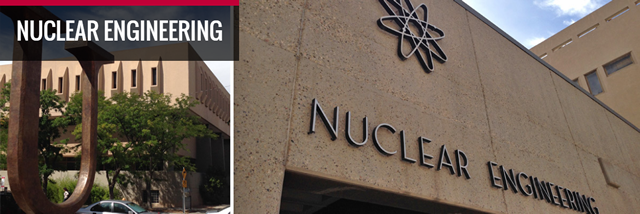
Nuclear Engineering ETDs
Publication Date
Spring 5-12-2022
Abstract
Nonlinear gray thermal radiation transport (TRT) in binary statistical mixtures is investigated through Implicit Monte Carlo (IMC) simulation on one-dimensional planar Markovian geometries and two dimensional approximate Markovian or Poisson-Box geometries. A stochastic geometry option was implemented in the Los Alamos National Laboratory Branson IMC solver which yielded benchmark solutions by simulating thermal radiation and material energy transport over a large number of instantiations of the geometry followed by ensemble averaging to obtain conditionally averaged radiation intensity and material temperatures. A chord length sampling method was also implemented based on a heuristic generalization of the Levermore-Pomraning homogenized medium model to incorporate nonlinear temperature dependence of the opacities and emission.
The emphasis of the computational work was on assessing the accuracy of the chord length approximation under optically thick conditions where transport is diffusive. Specifically, a previously published stochastic void-thick mixture model was adapted from a one-dimensional linear case to apply to (i) two-dimensional linear, (ii) one-dimensional nonlinear TRT, and (iii) two-dimensional nonlinear TRT. Results show a more rapid breakdown of the atomic mix diffusion limit in the regime of 2D stochastic geometries, as well as verifying that the diffusion limit approximations do not differ in the context of multidimensional stochasticity but are more strict. In the case of the Marshak wave modeled in TRT, it is observed that the fundamental properties in usual TRT physics make resolving the atomic mix conditions difficult, especially given the mesh refinement limits imposed by IMC methodology.
The extension of the Levermore-Pomraning model to the TRT physics regime contributes an additional source of error arising from inexact handling of nonlinear temperature dependence in the constitutive material properties, specifically, replacing averages of nonlinear functions of temperature by functions of the average temperature. A novel method of TRT in the context of a zero-dimensional time-dependent stochastic media problem is presented, which preserves the jointly Markovian construction of the LP approximation and allows for a formulation of the 0D TRT equations such that the only contributing source of error is the heuristic treatment of nonlinearities in material properties. The model is observed to reduce to a deterministic equilibrium value under the conditions of equivalent thermal material properties, namely mass density and specific heat capacity. The solution of such a model allows for a detailed analysis into how the probability density profiles of stochastic parameters within the system compare to the conditional averages generated via a heuristic treatment of the material property nonlinearities
Keywords
thermal radiative transport, stochastic geometry, Implicit Monte Carlo, Poisson-Box geometry, chord length sampling, temperature nonlinearity
Document Type
Dissertation
Language
English
Degree Name
Nuclear Engineering
Level of Degree
Doctoral
Department Name
Nuclear Engineering
First Committee Member (Chair)
Hyoung Lee
Second Committee Member
Anil Prinja
Third Committee Member
Forrest Brown
Fourth Committee Member
Christopher Perfetti
Fifth Committee Member
Todd Palmer
Recommended Citation
Skinner, Corey Michael. "Simulation of Thermal Radiation Transport in Stochastic Media with Nonlinear Temperature Dependence." (2022). https://digitalrepository.unm.edu/ne_etds/111
